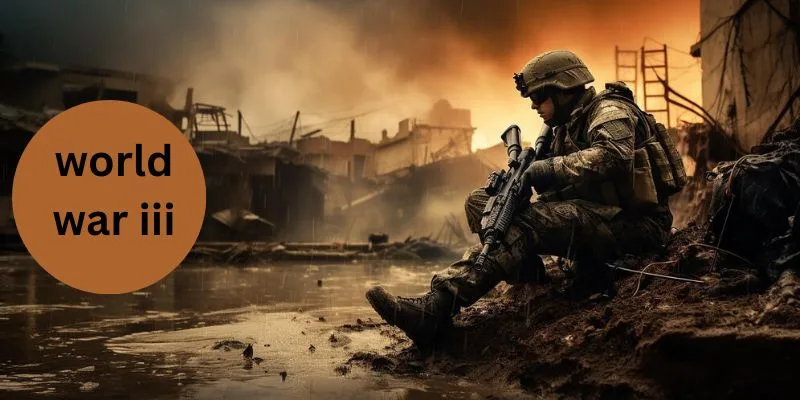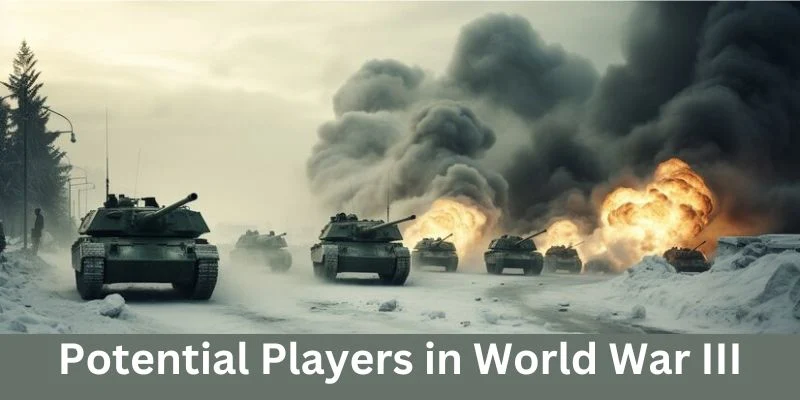Understanding the Possibility of World War III
Updated: June 9, 2024
83
Suppose a world is destroyed in a conflict, a global war, unlike anything we have ever seen. That is the chilling vision of World War III. It is a word that sends quakes down crests, conjuring visions of defeat and destruction of the intricacies of World War III. We’ll delve into what power looks like, the potential reasons, and the nightmarish results. But most importantly, we’ll even consult ways to work toward stability and prevent such a disaster.
World War III A War We Hope Never Happens
World War III (WWIII) was a period for a theoretical future war that would be even more general and dangerous than World Wars I (1914-1918) and II (1939-1945).
Global Conflict: Unlike little regional wars, World War III would interest multiple major countries defying worldwide. Suppose a giant fight where many other countries are on fighting sides.

Devastating Consequences: Because of the powerful weapons we have today, a world war would probably cause much more harm and death than any war earlier. It could affect nuclear weapons and powerful bombs that can cause general descent.
Why is it Hypothetical?
Thankfully, World War III has not been so distant. Many governments work together to stop such a large-scale war via diplomacy (peaceful communication) and global organizations like the United Nations (UN).
Why is it Important to Talk About?
Even though it is a problematic idea, understanding the vision of World War III can help us enjoy peace and the importance of settling disputes peacefully. By performing together, governments can bypass such a war altogether.
World War III Why It Matters and What Could Happen
The concept of World War III (WWIII) is dangerous. It gathers images of mushroom clouds and general destruction. But what precisely would it suggest if such a battle transpired?
Significance of World War III
A third world war would not be like the wars of history. Imagine a fight that affects multiple nations and has the potential to be far more devastating than anything we have seen earlier.
Global Scale
Unlike earlier world wars, WWIII could involve countries worldwide, involving a more complete scope of people and areas.
Advanced Weapons
Current action includes refined weaponry like long-range missiles and, of course, nuclear bombs. These could inflict destructive damage on a vast ranking.
Cyberwarfare
Wars are no longer just fought on battlefields. Cyberattacks could turn off vital infrastructure like power grids and contact systems, driving general confusion.
Potential Ramifications of World War III
The results of WWIII would be far-reaching and enduring.
- Widespread Destruction
Nuclear weapons or large-scale traditional warfare could destroy cities, infrastructure, and natural landscapes.
- Loss of Life
The number of deaths could be massive, with both soldiers and civilians dying in the battle.
- Global Famine
Disrupted food display and issuance systems could lead to general hunger and malnutrition.
- Economic Collapse
The global thrift would likely halt, driving financial ruin for many countries.
- Environmental Damage
Warfare can severely impact the environment, with the potential for long-term consequences like air and water pollution.
- Long-Term Instability
The social and political order would likely be shaken for decades, potentially leading to further conflicts.
Causes of World War III
While the belief of a third world war is scary, it is crucial to comprehend the possible reasons to work towards peace—studying some factors that could contribute to a large-scale international contest.
1. Escalation of Regional Conflicts
Existing tensions between countries can spiral out of control. Imagine a fight between neighbours that pulls in the whole street! Regional conflicts, like the one in Ukraine, have the potential to drag in significant powers due to alliances or resource interests. It can quickly turn a local war into a global one.
2. Nuclear Weapons
The Cold War directed us to the chilling chance of nuclear war. While the danger of a direct superpower fight has been relieved, the presence of atomic weapons in the hands of multiple countries poses a steady threat. Even a limited nuclear deal could have devastating effects.
3. Cyberwarfare Technology
Our growing support of technology makes exposure. A crippling cyberattack on a nation’s infrastructure (power grid, communication systems) could be seen as an action of war, showing a military reaction.
4. Resource Scarcity
Water, food, and energy are necessary for survival. As the global population expands, a contest for this help could intensify. If prudence fails, countries might resort to force to secure their demands.
5. Ideological Clashes
Profound ideological differences between governments can lead to conflict. Guess what? They are two neighbours who can not agree on anything. If a nation’s core values are under attack, it will be willing to fight to safeguard them.
Potential Players in World War III
While the idea of World War III is terrifying, staying informed is essential. focusing too much on the negative can be overwhelming. Take an honest look at some countries that could be applied in a major international conflict while emphasizing that prudence and de-escalation are everyone’s top preferences.

Major Powers
- United States and NATO
As the head of NATO (North Atlantic Treaty Organization), a large-scale battle would likely affect the US. NATO countries have a joint defence pact, so an invasion of one is seen as an aggression on all.
- Russia
Russia’s current actions and nuclear arsenal make it an effective player. A broader conflict applying NATO could potentially remove them.
- China
China’s rising military power and territorial conflicts in the South China Sea make it a powerful player, particularly if the conflict borders on its claims.
Regional Flashpoints
- North Korea
North Korea’s nuclear schedule and history of threats make it a wild card. Its surprising leadership raises worries about potential involvement in the broader match.
- Middle East
The constant pressures between Israel and Iran, along with the multiple conflicts in the area, could explode into a larger war that marks in other nations.
- India
A rising power with many residents and an increasing military.
- Iran
A provincial power with considerable influence in the Middle East.
Non-State Actors
- Terrorist Groups
Groups like ISIS or al-Qaeda could use the chaos of war to launch attacks.
- Cyber Warfare Entities
Nations or separated groups could use cyberattacks to disrupt infrastructure and cripple economizing.
The Role of Citizens
While governments have the final say on whether to go to war, residents can foster peace. Staying informed about global issues and advocating for peaceful resolutions are essential steps. By understanding potential conflicts and the importance of diplomacy, we can all work towards a safer world.
What Could Spark World War III?
The very idea of World War III is sufficient to send quakes down anyone’s crest. At the exact time, the Cold War’s nuclear standoff might seem like a relic of the past. Tensions between significant powers are a regular reminder that global peace is weak.
- Military Might on the Move
Things can get dirty when countries with powerful militaries fight over territory. Suppose a system where a land or sea border conflict between countries escalates into an armed battle. A slight conflict can snowball into a large-scale war if other countries with corps or claims in the area get drawn in.
- Doomsday Devices
The use of weapons of mass defeat (WMDs), like nuclear bombs or chemical weapons, would be disastrous. These weapons are created for mass collapse and could cause incredible harm. Even the threat of a WMD attack can start a preemptive strike, leading to a devastating chain reaction.
- War in the Wires
Cyber warfare is a growing danger. Imagine a system where a nation launches a crippling cyber attack on another country’s infrastructure, bearing down power grids or economic systems. This could be seen as an act of war, directing to a real-world military response. Disinformation drives, where fake news and propaganda are used to sow confusion and discord, can also destabilize regions and raise tensions.
World War III A Look at the Devastating Possibilities
World War III’s concept is sufficient to send quakes down anyone’s backbone. It is a movie plan, but the truth would be far more dreadful. The possible outcomes if such a global conflict were to erupt.
1. Global Devastation and Loss of Life:
Current warfare is unlike anything the world has seen earlier. With advanced weaponry and the possible use of nuclear, chemical, or biological weapons, the destruction would be fantastic. Entire metropolises could be lowered to trash, and the loss of life could be in the millions.
2. Economic Collapse and Infrastructure Crumbling:
Warfare disrupts everything. Exchange would halt, plants would be destroyed, and global economies would crumble. Food and needs would become short, leading to general hunger and poverty. Infrastructure like power grids, communication networks, and transportation systems would likely be targeted, making conditions even more challenging.
3. A New World Order:
The global power dynamic would be reshaped entirely after such a massive conflict. The countries that emerged victorious, if any, would be the new dominant forces. Alliances would be broken, and new ones would be formed, potentially rewriting the entire world order.
What can we do?
While studying World War III is scary, it’s crucial to recognize that diplomacy and dispute solutions are essential. We can donate to a more peaceful world by helping communities work for peace and holding our leaders responsible for their activities.
Katt Williams World War iii
In his tardily stand-up unique, “World War III,” jokester Katt Williams dives into the weighty issue of the global contest with his autographed comedic flair. While the tag might raise eyebrows, Williams concentrates on seeing the humour in everyday follies that could surface from such a system. Expect a light-hearted quest of navigating life’s challenges – from the everyday to the excessive – all born in Williams’ active and side-splitting fashion.
| Prons |
|---|
|
| Cons |
|---|
|
Conclusion
The very belief of World War III is sufficient to spark fear and stress. It collects images of a global competitor, unlike anything humanity has ever seen, with general destruction and loss of life. Thankfully, the world has come a long way since the colossal wars of the 20th century. Leaders comprehend the dreadful results, and most nations prioritize prudence and communication to resolve conflicts. Global cooperation on global security and weather change helps foster trust and keeps tensions in check.
Please Write Your Comments